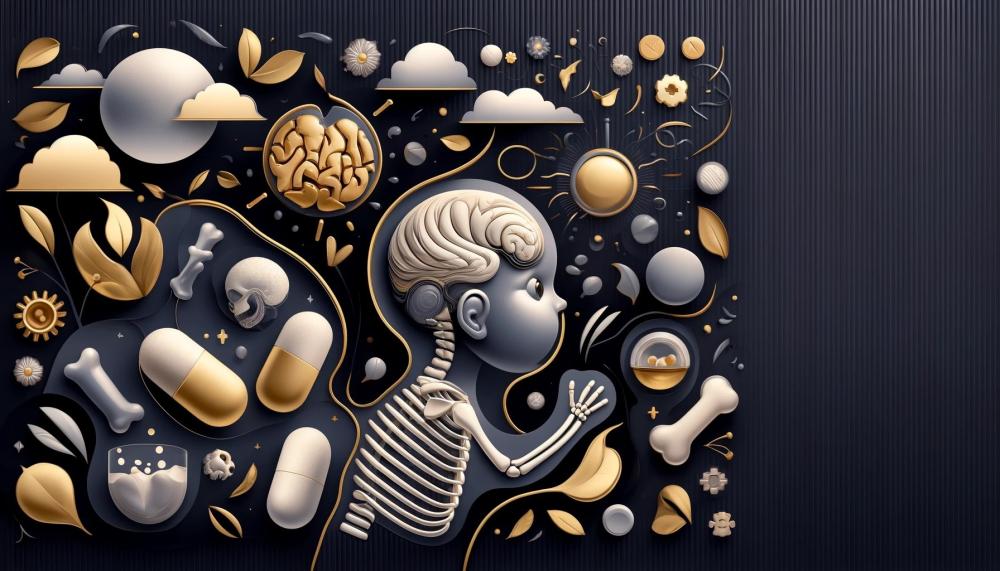
First, vitamin D:
Vitamin D is an essential nutrient for the healthy growth and development of children, as it plays a vital role in many bodily functions, including:
- Calcium and phosphorus absorption: essential for building strong bones and teeth.
- Immune function: Enhances the body's ability to resist infection.
- Nervous system functions: Supports brain growth and development.
- Muscle functions: Helps control muscle movement and coordination.
Children's vitamin D needs vary depending on their age:
- Infants:
- It is recommended that all infants be given a vitamin D supplement of 10 micrograms (mcg) per day, even if they are exclusively breastfed, because breast milk contains a small amount of vitamin D.
- Some foods fortified with vitamin D, such as infant formula, may also help meet an infant's needs.
- children:
- Children between the ages of 1 and 18 are recommended to take 600 mcg of vitamin D daily.
- Vitamin D can be obtained through exposure to sunlight, but some children may not get enough of it, especially during the winter or if they live in areas with little sunlight.
- Vitamin D can also be obtained from some foods, such as fatty fish and fortified dairy products, but these foods may not be enough to meet all children's needs.
- Some children may be advised to take additional vitamin D supplements, especially if they are not getting enough sun or food.
Symptoms of vitamin D deficiency in children:
- Rickets: a disease that causes bones to become weak and deformed.
- Growth retardation: Vitamin D deficiency can affect a child's growth, height, and weight.
- Muscle weakness: Children may experience muscle pain and weakness.
- Arthritis: Vitamin D deficiency can lead to arthritis and pain.
- Weak immune system: Children may be more susceptible to infections.
Fetal needs of vitamin D :
The fetus cannot obtain vitamin D from sunlight, as ultraviolet rays do not penetrate the placenta.
The fetus depends on getting vitamin D from the mother, either through her diet or through vitamin D supplements.
All pregnant women are advised to take 600 mg of vitamin D daily, even if they have a diet rich in vitamin D.
Symptoms of vitamin D deficiency in the fetus:
- Low bone density: May lead to rickets after birth.
- Growth retardation: Vitamin D deficiency can affect fetal growth, height, and weight.
- Muscle weakness: The baby may experience muscle pain and weakness after birth.
- Arthritis: Vitamin D deficiency can lead to arthritis and pain after childbirth.
- Weakened immune system: The baby may be more susceptible to infections after birth.
Tips to ensure your fetus gets enough vitamin D:
- Take vitamin D supplements as recommended by your doctor.
- Follow a diet rich in vitamin D.
- Regular sun exposure.
Secondly, calcium
Calcium is an essential mineral for the healthy growth and development of children, as it plays a vital role in many functions, including:
- Building bones and teeth: Calcium is the main component of bones and teeth, and is essential for their growth and making them strong and dense.
- Muscle function: Calcium helps regulate muscle contraction and relaxation.
- Nervous system functions: Calcium helps transmit nerve signals between the brain and muscles.
- Blood clotting: Calcium plays an important role in the blood clotting process.
- Immune function: Calcium helps boost immune system function.
Children's calcium needs vary depending on their age:
- Infants:
- It is recommended that infants aged 0 to 6 months consume 200 mg of calcium daily.
- It is recommended that infants aged 7 to 12 months consume 250 mg of calcium daily.
- Calcium can be obtained for infants from breast milk or calcium-fortified infant formula.
- children:
- It is recommended that children aged 1 to 3 years consume 700 mg of calcium daily.
- It is recommended that children aged 4 to 8 years consume 1,000 milligrams of calcium daily.
- Children can get calcium from a variety of foods, such as dairy products, green leafy vegetables, legumes, nuts, and canned fish.
- Teenagers:
- The recommended daily intake of 1,300 milligrams of calcium is for adolescents aged 9 to 18 years.
- This age group is the period of peak bone growth, so getting enough calcium is essential for building strong, dense bones.
Symptoms of calcium deficiency in children:
- Rickets: a disease that causes bones to become weak and deformed.
- Delayed growth: Calcium deficiency can affect a child's growth, height, and weight.
- Muscle weakness: Children may experience muscle pain and weakness.
- Muscle cramps: Calcium deficiency can lead to muscle cramps.
- Osteoporosis: Children become more susceptible to bone fractures.
Fetal calcium needs:
Calcium is an essential mineral for the healthy growth and development of the fetus, as it plays a vital role in many functions, including:
- Building bones and teeth: Calcium is the main component of bones and teeth, and is essential for their growth and making them strong and dense.
- Muscle function: Calcium helps regulate muscle contraction and relaxation.
- Nervous system functions: Calcium helps transmit nerve signals between the brain and muscles.
- Blood clotting: Calcium plays an important role in the blood clotting process.
- Immune function: Calcium helps boost immune system function.
The fetus cannot obtain calcium from sunlight, as ultraviolet rays do not penetrate the placenta. The fetus relies on the mother for calcium, either through her diet or calcium supplements.
All pregnant women are advised to consume 1,000 milligrams of calcium daily, even if they have a calcium-rich diet.
The fetus begins to form its bones and teeth in the first weeks of pregnancy, so getting enough calcium is essential from the beginning of pregnancy.
Symptoms of calcium deficiency in the fetus:
- Low bone density: May lead to rickets after birth.
- Growth retardation: Calcium deficiency can affect the fetus's growth, length, and weight.
- Muscle weakness: The baby may experience muscle pain and weakness after birth.
- Arthritis: Calcium deficiency can lead to arthritis and pain after childbirth.
- Weakened immune system: The baby may be more susceptible to infections after birth.
Tips to ensure your fetus gets enough calcium:
- Take calcium supplements as recommended by your doctor.
- Follow a diet rich in calcium.
- Consult your doctor regularly to monitor your pregnancy health and ensure you are getting all the nutrients your fetus needs.
Bloomer 's calcium and vitamin D supplements, whether during pregnancy or throughout childhood, ensure your child's excellent health, healthy build, and perfect furnishings.
Shop safely from Bloomor .

